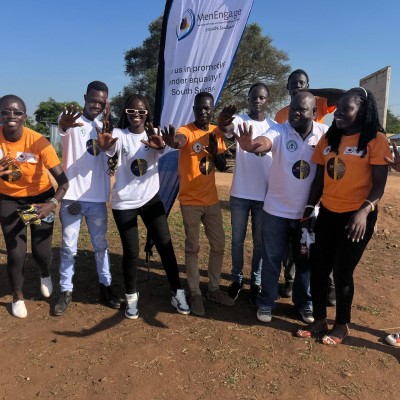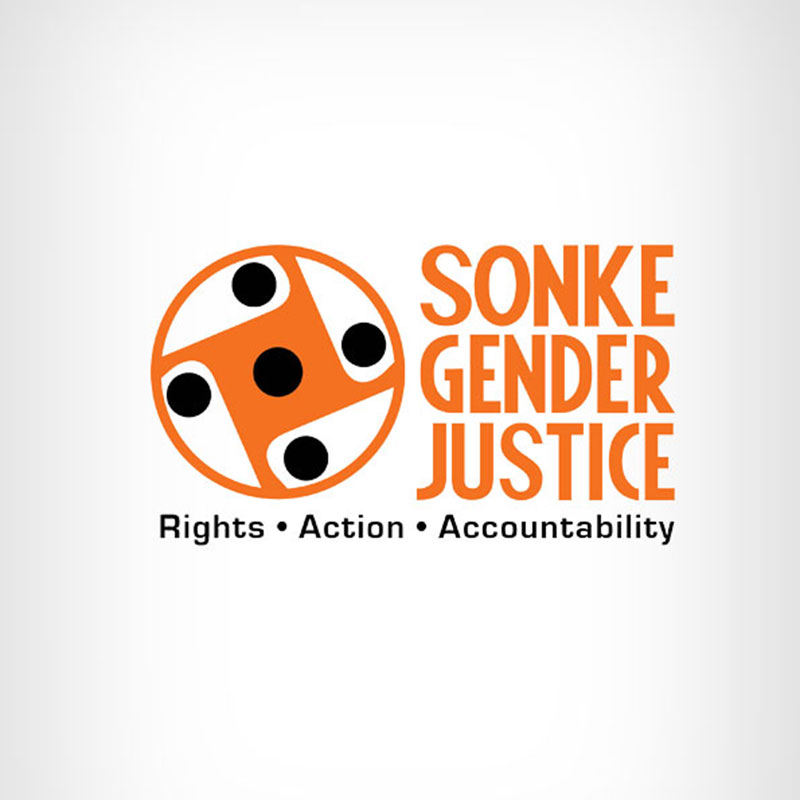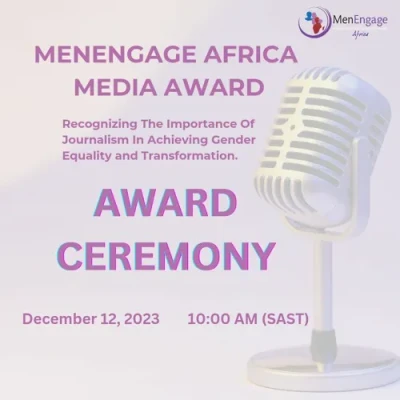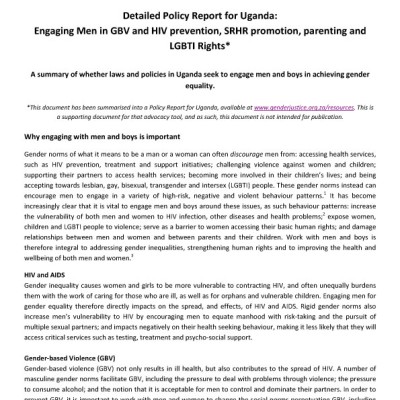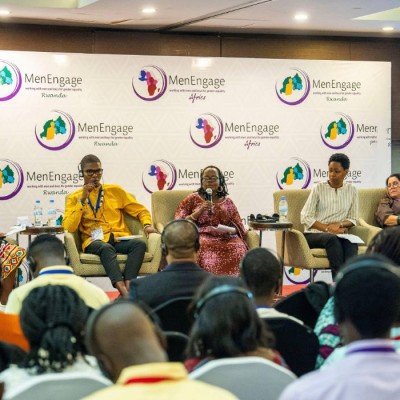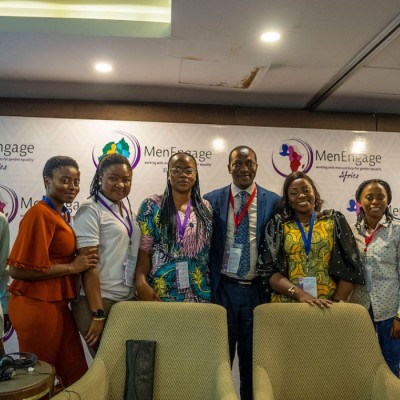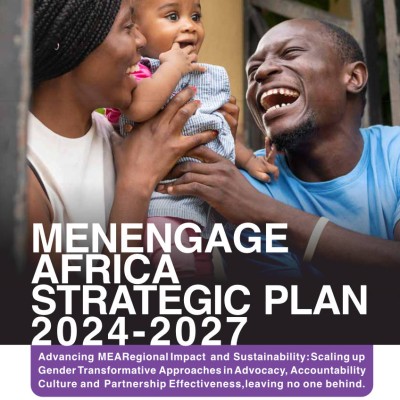Evidence has shown that if men are engaged in HIV and GBV prevention efforts, the promotion of sexual and reproductive health and involved parenting, there are great benefits for women, children and men themselves. Many men are already involved in these ways, but in order for widespread changes to take place, the engagement of men at policy level must be addressed.
In light of this, Sonke, on behalf of MenEngage Africa, have produced a set of national policy reports across Africa examining policies, laws and plans in the areas of: 1) HIV and AIDS; 2) Gender-Based Violence (GBV); 3) Sexual and Reproductive Health and Rights (SRHR); 4) parenting and 5) LGBTI issues. The reports assess the extent to which the policies contain language relating to the proactive and progressive engagement of men and boys across these critical areas for gender equality.
Additionally, a Policy Advocacy Toolkit has been created and published by Sonke to support organisations wanting to conduct policy advocacy work based on the findings of the national policy reports.
Policy Advocacy Toolkit
 In order to support policy advocacy work aimed at addressing policy gaps highlighted by the MenEngage Africa policy reports, Sonke and MenEngage Africa produced a Policy Advocacy Toolkit.
In order to support policy advocacy work aimed at addressing policy gaps highlighted by the MenEngage Africa policy reports, Sonke and MenEngage Africa produced a Policy Advocacy Toolkit.
This toolkit provides useful definitions; identifies key players in the production of policy; provides a step-by-step guide on how to successfully advocate, including a detailed case study example; discusses the use of the MenEngage Africa policy report series and policy advocacy work with regional economic communities; and provides a list of resources.
It targets organisations that work with men and boys for gender equality and the empowerment of women and girls. It is designed for use within an African context but may be amended to suit any country’s social, political and economic conditions. It is hoped that this toolkit will be particularly useful for MenEngage Africa partners who are committed to the task of creating gender equal societies on the continent.
Download
MenEngage Africa Policy Reports
Each report highlights findings, recommendations and suggests policy language. The reports can be used as advocacy and programming tools, to strengthen a focus on engaging men for gender equality within national laws and policies. Their key audiences are national and regional civil society, policy makers and decision-makers.
The reports, and the accompanying longer versions, were developed by Sonke in collaboration with MenEngage partners, and with the support of the United Nations Development Programme (UNDP), the United Nations Population Fund (UNFPA), the UN Trust Fund to End Violence Against Women administered by UN Women, and the Swedish International Development Cooperation Agency (SIDA).
Please click on the links below to access the policy reports, as well as the detailed overall reports (of which the published reports are a summary).
Kenya
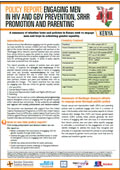 The analysis found that Kenya’s sexual and reproductive health (SRH) and parenting policies seek to positively engage with men in a number of ways. Unfortunately, while there are positive aspects to Kenya’s National AIDS Strategic Plan (NSP) and Kenya’s gender-based violence (GBV) policies, these policies generally fall short in terms of engaging with men and boys. It is recommended that Kenya’s policies, laws and plans utilise specific language to articulate a commitment to the engagement of men, and identify strategies to address the issues they recognise and articulate. It is especially important for policies to acknowledge the role played by gender norms and plan work that aims to address and transform gender norms.
The analysis found that Kenya’s sexual and reproductive health (SRH) and parenting policies seek to positively engage with men in a number of ways. Unfortunately, while there are positive aspects to Kenya’s National AIDS Strategic Plan (NSP) and Kenya’s gender-based violence (GBV) policies, these policies generally fall short in terms of engaging with men and boys. It is recommended that Kenya’s policies, laws and plans utilise specific language to articulate a commitment to the engagement of men, and identify strategies to address the issues they recognise and articulate. It is especially important for policies to acknowledge the role played by gender norms and plan work that aims to address and transform gender norms.
Download
- Kenya: Policy Report
- Kenya Detailed Policy Report: Engaging Men in HIV, GBV, SRH, parenting and LGBTI
Rwanda
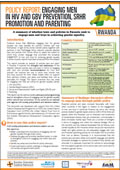 The analysis found that Rwanda’s policies and plans compare favourably with many other countries in the region in relation to the engagement of men and boys. In particular Rwanda has some very strong policies related to gender-based violence (GBV). While there are aspects within the Rwandan Law on Prevention and Punishment of Gender-Based Violence that are problematic, commendably it does criminalise marital rape. There are a number of strengths in terms of engaging men within the National Strategic Plan on HIV and AIDS and the National Accelerated Plan for Women, Girls, Gender Equality & HIV. However, certain sexual and reproductive health and rights policies do not adequately engage with men, and Rwanda’s parenting policies do not enable men to prioritize their role as fathers.
The analysis found that Rwanda’s policies and plans compare favourably with many other countries in the region in relation to the engagement of men and boys. In particular Rwanda has some very strong policies related to gender-based violence (GBV). While there are aspects within the Rwandan Law on Prevention and Punishment of Gender-Based Violence that are problematic, commendably it does criminalise marital rape. There are a number of strengths in terms of engaging men within the National Strategic Plan on HIV and AIDS and the National Accelerated Plan for Women, Girls, Gender Equality & HIV. However, certain sexual and reproductive health and rights policies do not adequately engage with men, and Rwanda’s parenting policies do not enable men to prioritize their role as fathers.
Download
- Rwanda:Policy Report
- Rwanda Detailed Policy Report: Engaging Men in HIV, GBV, SRH, parenting and LGBTI
Sierra Leone
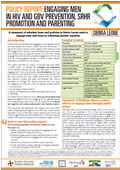 The analysis found that although Sierra Leone’s National Strategic Plan on HIV and AIDS 2011–2015 was published in 2011, it has not incorporated a sufficient focus on gender issues, or on the need to engage with men. With the passing of the Sexual Offences Act in August 2012, it is hoped that the political will to address gender-based violence (GBV) in Sierra Leone will continue to strengthen. Unfortunately, Sierra Leone’s sexual and reproductive health (SRH) policies do not sufficiently address men’s SRH needs, and do not take advantage of the benefits that men can provide through supporting their partners’ SRH. Certain policies that relate to parenting in Sierra Leone may reinforce traditional gender norms, rather than challenging such norms in order to encourage men to be more involved in parenting.
The analysis found that although Sierra Leone’s National Strategic Plan on HIV and AIDS 2011–2015 was published in 2011, it has not incorporated a sufficient focus on gender issues, or on the need to engage with men. With the passing of the Sexual Offences Act in August 2012, it is hoped that the political will to address gender-based violence (GBV) in Sierra Leone will continue to strengthen. Unfortunately, Sierra Leone’s sexual and reproductive health (SRH) policies do not sufficiently address men’s SRH needs, and do not take advantage of the benefits that men can provide through supporting their partners’ SRH. Certain policies that relate to parenting in Sierra Leone may reinforce traditional gender norms, rather than challenging such norms in order to encourage men to be more involved in parenting.
Download
South Africa
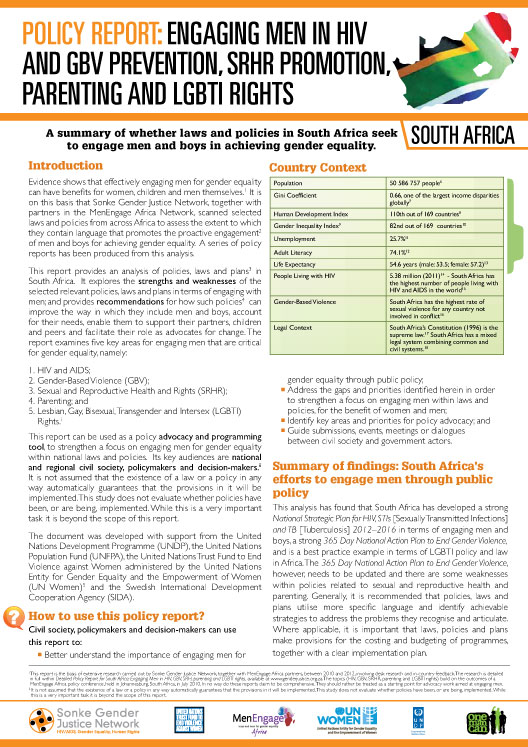 The analysis found that South Africa has developed a strong National Strategic Plan for HIV, STIs and TB 2012–2016 in terms of engaging men and boys, a strong 365 Day National Action Plan to End Gender Violence, and is a best practice example in terms of LGBTI policy and law in Africa. The 365 Day National Action Plan to End Gender Violence, however, needs to be updated and there are some weaknesses within policies related to sexual and reproductive health and parenting. Generally, it is recommended that policies, laws and plans utilise more specific language and identify achievable strategies to address the problems they recognise and articulate. Where applicable, it is important that laws, policies and plans make provisions for the costing and budgeting of programmes, together with clear implementation plans.
The analysis found that South Africa has developed a strong National Strategic Plan for HIV, STIs and TB 2012–2016 in terms of engaging men and boys, a strong 365 Day National Action Plan to End Gender Violence, and is a best practice example in terms of LGBTI policy and law in Africa. The 365 Day National Action Plan to End Gender Violence, however, needs to be updated and there are some weaknesses within policies related to sexual and reproductive health and parenting. Generally, it is recommended that policies, laws and plans utilise more specific language and identify achievable strategies to address the problems they recognise and articulate. Where applicable, it is important that laws, policies and plans make provisions for the costing and budgeting of programmes, together with clear implementation plans.
Download
- South Africa: Policy Report
- South Africa Detailed Policy Report: Engaging Men in HIV, GBV, SRH, parenting and LGBTI
Uganda
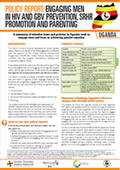 The analysis found that Uganda’s policies and plans regarding HIV need to be updated, and should include a stronger emphasis on targeting men and influencing gender norms. Gender-based violence (GBV) policies and plans prioritise the need to engage with men, but that the accompanying laws are lacking. While the sexual and reproductive health (SRH) policies are strong in terms of engaging with men as clients of SRH, they are weak in terms of engaging with men as partners or as advocates for change. Uganda’s parenting policies are inconsistent in terms of positively engaging with men.
The analysis found that Uganda’s policies and plans regarding HIV need to be updated, and should include a stronger emphasis on targeting men and influencing gender norms. Gender-based violence (GBV) policies and plans prioritise the need to engage with men, but that the accompanying laws are lacking. While the sexual and reproductive health (SRH) policies are strong in terms of engaging with men as clients of SRH, they are weak in terms of engaging with men as partners or as advocates for change. Uganda’s parenting policies are inconsistent in terms of positively engaging with men.
Download
- Uganda: Policy Report
- Uganda Detailed Policy Report: Engaging Men in HIV, GBV, SRH, parenting and LGBTI
Zambia
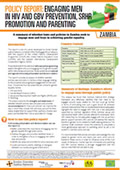 The analysis found that Zambia’s National AIDS Strategic Framework effectively identifies that men need to be engaged around issues related to HIV, but could go further in terms of articulating how such a goal should be achieved. Zambia’s National Action Plan on Gender-Based Violence adequately highlights the need to engage with men, but is less adequately supported by Zambian legislation. While Zambian sexual and reproductive health (SRH) policies attempt to emphasise men’s SRH needs, they do not adequately engage with men as partners able to support women’s SRH, and do not address the need to transform gender norms related to health seeking behaviour. The Zambian Draft Constitution shows the potential to precipitate a more gender-equal approach to parenting, which as yet is not evident in Zambian policy and law.
The analysis found that Zambia’s National AIDS Strategic Framework effectively identifies that men need to be engaged around issues related to HIV, but could go further in terms of articulating how such a goal should be achieved. Zambia’s National Action Plan on Gender-Based Violence adequately highlights the need to engage with men, but is less adequately supported by Zambian legislation. While Zambian sexual and reproductive health (SRH) policies attempt to emphasise men’s SRH needs, they do not adequately engage with men as partners able to support women’s SRH, and do not address the need to transform gender norms related to health seeking behaviour. The Zambian Draft Constitution shows the potential to precipitate a more gender-equal approach to parenting, which as yet is not evident in Zambian policy and law.
Download
- Zambia: Policy Report
- Zambia Detailed Policy Report: Engaging Men in HIV, GBV, SRH, parenting and LGBTI
Malawi
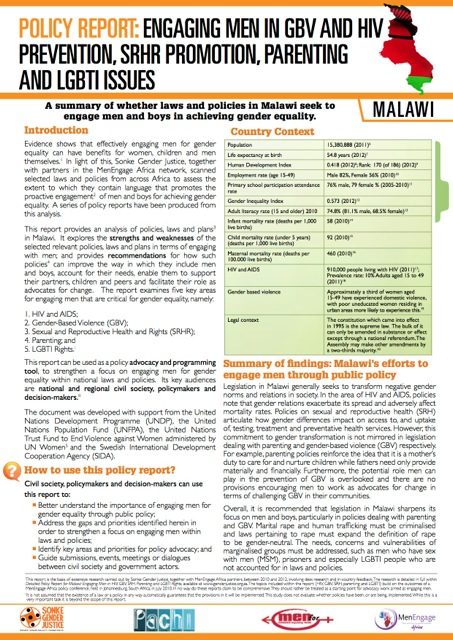 Legislation in Malawi generally seeks to transform negative gender norms and relations in society. In the area of HIV and AIDS, policies note that gender relations exacerbate its spread and adversely affect mortality rates. Policies on sexual and reproductive health articulate how gender differences impact on access to, and uptake of, testing, treatment and preventative health services. However, this commitment to gender transformation is not mirrored in policies dealing with parenting and gender-based violence (GBV) respectively. For example, parenting policies reinforce the idea that it is a mother’s duty to care for and nurture children while fathers need only provide materially and financially. Furthermore, the potential role men can play in the prevention of GBV is overlooked and there are no provisions encouraging men to work as advocates for change in terms of challenging GBV in their communities.
Legislation in Malawi generally seeks to transform negative gender norms and relations in society. In the area of HIV and AIDS, policies note that gender relations exacerbate its spread and adversely affect mortality rates. Policies on sexual and reproductive health articulate how gender differences impact on access to, and uptake of, testing, treatment and preventative health services. However, this commitment to gender transformation is not mirrored in policies dealing with parenting and gender-based violence (GBV) respectively. For example, parenting policies reinforce the idea that it is a mother’s duty to care for and nurture children while fathers need only provide materially and financially. Furthermore, the potential role men can play in the prevention of GBV is overlooked and there are no provisions encouraging men to work as advocates for change in terms of challenging GBV in their communities.
Download
Tanzania
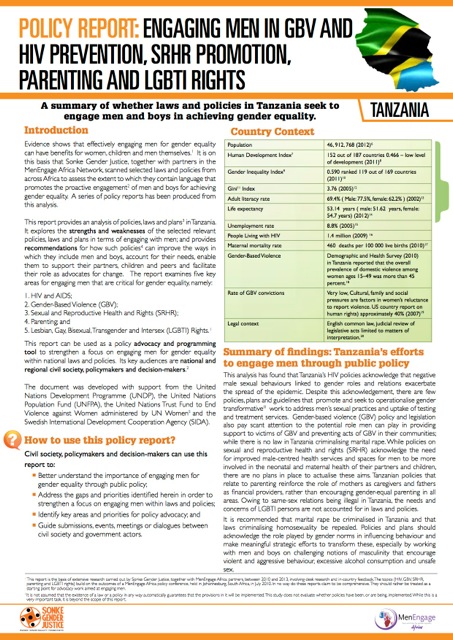 Few of Tanzania’s HIV policies promote and seek to operationalise gender transformative work to address men’s sexual practices and uptake of testing and treatment services. Gender-based violence (GBV) policies and legislation also pay scant attention to the potential role men can play in providing support to victims of GBV and preventing acts of GBV in their communities. While policies on sexual and reproductive health and rights acknowledge the need for improved male-centred health services and spaces for men to be more involved in the neonatal and maternal health of their partners and children, there are no plans in place to actualise these aims. Tanzanian policies that relate to parenting reinforce the role of mothers as caregivers and fathers as financial providers, rather than encouraging gender-equal parenting in all areas. Finally, owing to same-sex relations being illegal in Tanzania, the needs and concerns of LGBTI persons are not accounted for in laws and policies.
Few of Tanzania’s HIV policies promote and seek to operationalise gender transformative work to address men’s sexual practices and uptake of testing and treatment services. Gender-based violence (GBV) policies and legislation also pay scant attention to the potential role men can play in providing support to victims of GBV and preventing acts of GBV in their communities. While policies on sexual and reproductive health and rights acknowledge the need for improved male-centred health services and spaces for men to be more involved in the neonatal and maternal health of their partners and children, there are no plans in place to actualise these aims. Tanzanian policies that relate to parenting reinforce the role of mothers as caregivers and fathers as financial providers, rather than encouraging gender-equal parenting in all areas. Finally, owing to same-sex relations being illegal in Tanzania, the needs and concerns of LGBTI persons are not accounted for in laws and policies.
Download
Namibia
 The analysis, carried out in 2012, found that while gender inequality is acknowledged within Namibia’s National Strategic Framework for HIV and AIDS, it is not afforded sufficient consideration and there is almost no planned interaction with men. Namibia’s GBV and parenting policies contain several strategies for engaging men and the sexual and reproductive health policies are both strategic and progressive in terms of behaviour changing interventions being combined with women’s empowerment programmes. However, concrete Information, Education, Communication (IEC) strategies or male-targeted service provision have unfortunately not yet been developed and because homosexuality is outlawed in Namibia the LGBTI population is left out of key pieces of legislation.
The analysis, carried out in 2012, found that while gender inequality is acknowledged within Namibia’s National Strategic Framework for HIV and AIDS, it is not afforded sufficient consideration and there is almost no planned interaction with men. Namibia’s GBV and parenting policies contain several strategies for engaging men and the sexual and reproductive health policies are both strategic and progressive in terms of behaviour changing interventions being combined with women’s empowerment programmes. However, concrete Information, Education, Communication (IEC) strategies or male-targeted service provision have unfortunately not yet been developed and because homosexuality is outlawed in Namibia the LGBTI population is left out of key pieces of legislation.
Download
Ethiopia
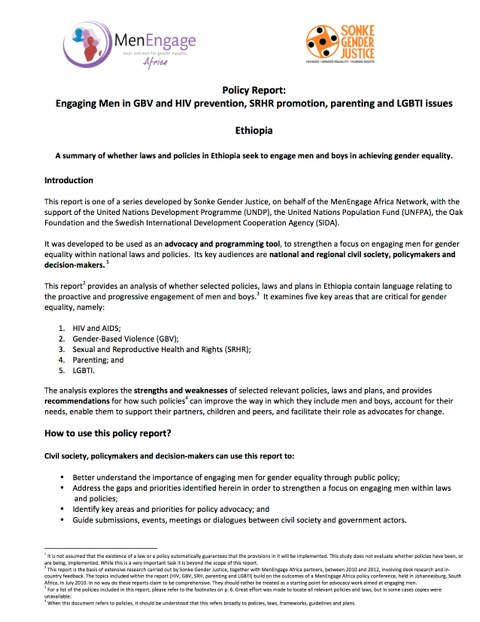 The analysis found that most policies and plans acknowledge that there is gender inequality between men and women in the Ethiopian society. For example, HIV and AIDS policies recognise that gender is a key driver of the pandemic and that women are more vulnerable to the disease than men. However, in most legislation, discussions on gender norms and roles are minimal and do not go into enough depth, especially on the impact of negative masculinities. This is most notable in the legal provisions dealing with gender-based violence. The only pieces of legislation that directly engage men are those dealing with sexual and reproductive health and parenting. Finally, marginalised men are minimally accounted for in policies, such as imprisoned men and men who have sex with men. In fact, because homosexuality is outlawed in Ethiopia, LGBTI people are left out of key legislation and are not able to access vital health services and other legal entitlements.
The analysis found that most policies and plans acknowledge that there is gender inequality between men and women in the Ethiopian society. For example, HIV and AIDS policies recognise that gender is a key driver of the pandemic and that women are more vulnerable to the disease than men. However, in most legislation, discussions on gender norms and roles are minimal and do not go into enough depth, especially on the impact of negative masculinities. This is most notable in the legal provisions dealing with gender-based violence. The only pieces of legislation that directly engage men are those dealing with sexual and reproductive health and parenting. Finally, marginalised men are minimally accounted for in policies, such as imprisoned men and men who have sex with men. In fact, because homosexuality is outlawed in Ethiopia, LGBTI people are left out of key legislation and are not able to access vital health services and other legal entitlements.
Download
The Democratic Republic of the Congo (DRC)
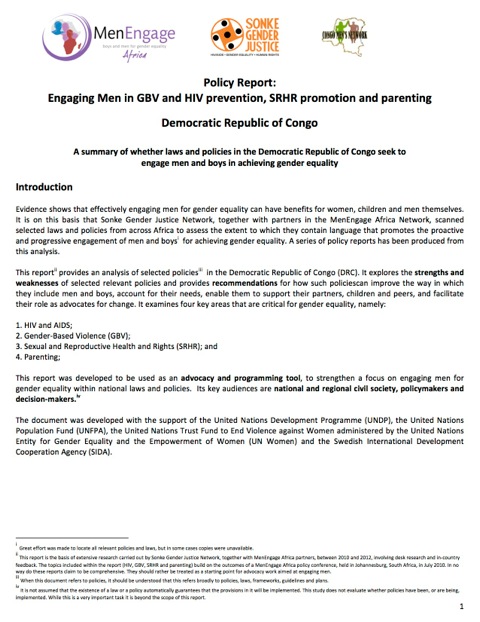 This analysis found that the DRC has made efforts in terms of engaging men and boys, but should include a stronger emphasis on influencing gender norms. While the sexual and reproductive health policies are engaging with men as clients, they are weak in engaging them as advocates for change. Specific steps need to be taken to directly target men, especially in relation to parenting and encouraging men to be role models. Where applicable, strategies aiming to address underlying causes, including gender norms and the engagement of men should be specified. Marginalised men particularly need to be properly engaged within all relevant policies and the violence men experience should also be acknowledged and accounted for.
This analysis found that the DRC has made efforts in terms of engaging men and boys, but should include a stronger emphasis on influencing gender norms. While the sexual and reproductive health policies are engaging with men as clients, they are weak in engaging them as advocates for change. Specific steps need to be taken to directly target men, especially in relation to parenting and encouraging men to be role models. Where applicable, strategies aiming to address underlying causes, including gender norms and the engagement of men should be specified. Marginalised men particularly need to be properly engaged within all relevant policies and the violence men experience should also be acknowledged and accounted for.
Download
Please note that the report in French will be uploaded to the website soon.
Zimbabwe
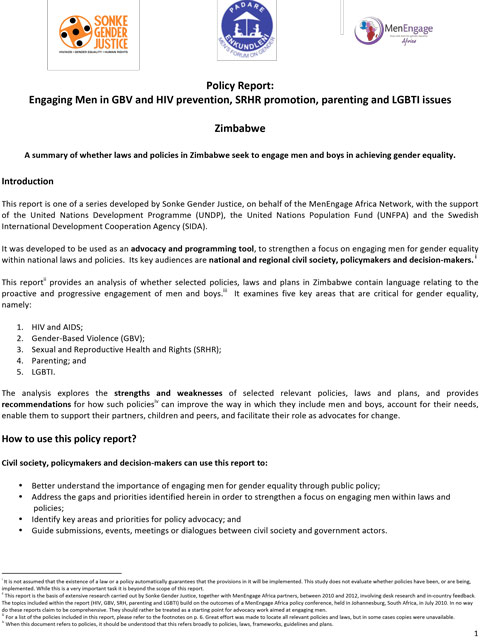 This analysis has found that Zimbabwe’s policies and plans regarding HIV and AIDS offer comprehensive prevention strategies that combine uptake of condoms, roll out of medical male circumcision (MMC) as well as testing and treatment. However, these do not address the link between HIV and gender and the role that negative masculinities play in exacerbating its spread. The tendency to overlook the impact of gender norms can also be found in policies dealing with gender-based violence (GBV). Legislation on sexual and reproductive health (SRH) includes programming that directly targets men, calling them to change dangerous sexual practices such as having multiple sexual partners and under utilising condoms whilst also encouraging them to become involved in the maternal and neonatal health of partners and children. The same level of engagement with men can also be noted in policies related to parenting which encourage equal parenting between men and women. However, both SRHR and parenting policies do not fully discuss the role played by harmful gender norms or strongly emphasise the importance of male involvement. Another important omission is that the needs and concerns of LGBTI persons are not accounted for in laws and policies because homosexuality is illegal in Zimbabwe.
This analysis has found that Zimbabwe’s policies and plans regarding HIV and AIDS offer comprehensive prevention strategies that combine uptake of condoms, roll out of medical male circumcision (MMC) as well as testing and treatment. However, these do not address the link between HIV and gender and the role that negative masculinities play in exacerbating its spread. The tendency to overlook the impact of gender norms can also be found in policies dealing with gender-based violence (GBV). Legislation on sexual and reproductive health (SRH) includes programming that directly targets men, calling them to change dangerous sexual practices such as having multiple sexual partners and under utilising condoms whilst also encouraging them to become involved in the maternal and neonatal health of partners and children. The same level of engagement with men can also be noted in policies related to parenting which encourage equal parenting between men and women. However, both SRHR and parenting policies do not fully discuss the role played by harmful gender norms or strongly emphasise the importance of male involvement. Another important omission is that the needs and concerns of LGBTI persons are not accounted for in laws and policies because homosexuality is illegal in Zimbabwe.
Download
Upcoming policy reports
The policy report for the following country is currently being drafted and will soon be available: Mozambique.
Scorecards on GBV Laws and Policy
Engaging men and boys in the prevention and elimination of gender-based violence (GBV) on the African continent
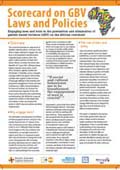 In preparation for the 57th Commission on the Status of Women, bearing in mind that the elimination and prevention of all forms of violence against women and girls is the priority theme, Sonke Gender Justice, with support from UNFPA, SIDA and UN Women, developed a scorecard of GBV Laws and Policies in Africa.
In preparation for the 57th Commission on the Status of Women, bearing in mind that the elimination and prevention of all forms of violence against women and girls is the priority theme, Sonke Gender Justice, with support from UNFPA, SIDA and UN Women, developed a scorecard of GBV Laws and Policies in Africa.
This scorecard provides an assessment of whether national policies and laws in the African region attempt to engage men and boys in the prevention and elimination of gender-based violence (GBV). The report analyses policies and laws from eleven African countries: the Democratic Republic of Congo (DRC), Ethiopia, Kenya, Malawi, Rwanda, Sierra Leone, South Africa, Tanzania, Uganda, Zambia and Zimbabwe.
It identifies various strengths and gaps within the region’s GBV policies and laws with regards to their inclusion of language relating to the proactive and progressive engagement of men and boys. Furthermore, it offers recommendations for how such policies can increase the commitment and capacity of men and boys to play a proactive role in preventing and eliminating GBV.
The scorecard will be presented at the 57th CSW in New York and will also be disseminated at events within the region. It can be used as a policy advocacy tool to strengthen the engagement of men within policy for the prevention of gender-based violence.
The analysis found that many national policies aimed at addressing gender-based violence (GBV) in Africa need to be strengthened in terms of engaging with men and boys. While a few pieces of legislation articulate the importance of engaging men and boys for the elimination and prevention of GBV, with some notably mentioning the need to shift negative masculine norms and behaviours, there are hardly any which emphasise the need for Information, Education and Communication (IEC) or Behaviour and Communication Change (BCC) strategies in order to effectively operationalise this aim. In many of the policies, men are viewed primarily as perpetrators of GBV and are not engaged as potential advocates for change.
Download
- Scorecard on GBV Laws and Policies
- Scorecard on Gender-Based Violence Policies in Conflict & Post-Conflict Settings in Africa
Scorecard on Sexual and Reproductive Health and Rights (SRHR) policies in Africa
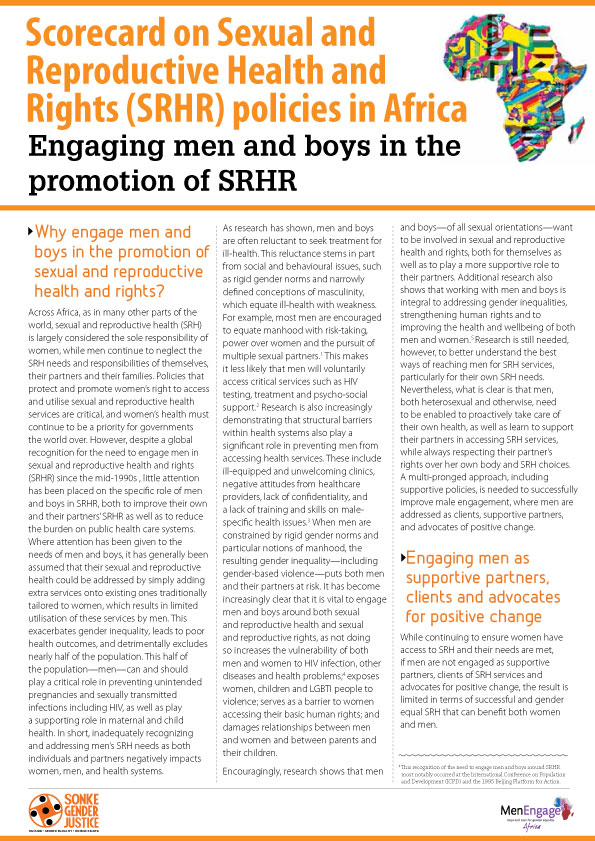 This scorecard provides an assessment of whether national policies from twelve African countries attempt to engage men and boys in the promotion of sexual and reproductive health and rights (SRHR): the Democratic Republic of the Congo (DRC), Ethiopia, Kenya, Malawi, Rwanda, Sierra Leone, South Africa, Tanzania, Uganda, Zambia and Zimbabwe. The Scorecard identifies various strengths and gaps within these countries’ SRHR policies with regards to their inclusion of language relating to the proactive and progressive engagement of men and boys. Furthermore, it offers recommendations for how such policies can increase the commitment and capacity of men and boys to play a proactive role in promoting SRHR. The scorecard is intended to be used by civil society, governments, policy-makers as well as decision-makers working in the development of policy and legislation on SRHR. It aims to enable a better understanding on how to improve SRHR for all citizens, including the importance of engaging men and boys in the promotion of SRHR. It also offers an opportunity to address the gaps and priorities identified in existing policies. It can also be used to identify key areas and priorities for policy advocacy.
This scorecard provides an assessment of whether national policies from twelve African countries attempt to engage men and boys in the promotion of sexual and reproductive health and rights (SRHR): the Democratic Republic of the Congo (DRC), Ethiopia, Kenya, Malawi, Rwanda, Sierra Leone, South Africa, Tanzania, Uganda, Zambia and Zimbabwe. The Scorecard identifies various strengths and gaps within these countries’ SRHR policies with regards to their inclusion of language relating to the proactive and progressive engagement of men and boys. Furthermore, it offers recommendations for how such policies can increase the commitment and capacity of men and boys to play a proactive role in promoting SRHR. The scorecard is intended to be used by civil society, governments, policy-makers as well as decision-makers working in the development of policy and legislation on SRHR. It aims to enable a better understanding on how to improve SRHR for all citizens, including the importance of engaging men and boys in the promotion of SRHR. It also offers an opportunity to address the gaps and priorities identified in existing policies. It can also be used to identify key areas and priorities for policy advocacy.

